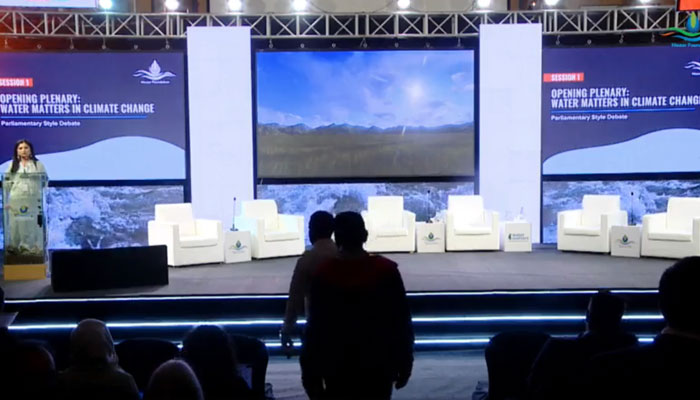International Water Conference: ‘Clean water, proper sanitation, hygiene crucial to end malnutrition’
KARACHI: The US government, through the US Agency for International Development (USAID), joined the Hisaar Foundation for the 6th Karachi International Water Conference that was held on Monday and Tuesday. The theme of the conference was ‘Bring Water Back to Climate Discourse’.
The conference focused on water-related disasters, their fundamental role in the global climate emergency, and the need for collective action to mitigate the damaging impacts of climate change. Experts and thought leaders working on water, climate, food and livelihood security came together to discuss the challenges and ways forward.
USAID’s Water Governance for Sindh Activity, implemented by the Health and Nutrition Development Society (HANDS), organised a panel discussion on ‘Synergising Growth: Public-Private Partnership Redefining Municipal Services’.
The session emphasised the significance of public-private partnerships (PPPs) in enhancing municipal services. The discussion explored collaboration opportunities and effective models, bringing together experts from relevant sectors to exchange insights and best practices.
“There is a pressing need for comprehensive, inclusive and transparent frameworks ensuring equitable distribution, conservation and efficient management of water resources,” said Rachel Grant, USAID regional office director, while speaking at the closing ceremony.
“Clean water, proper sanitation and hygiene are crucial to eradicating malnutrition. Our collective commitment to confronting these challenges head-on is so important for the health and well-being of our children.”
She praised the collective commitment and highlighted America’s continued commitment to fostering a resilient and thriving future for the people of Pakistan, and mentioned that the outcomes would not only bolster the Pakistani government’s efforts but also contribute to the upcoming World Water Forum and discussions at COP28 in Dubai.
She said that the critical role of safe water supply, and the demand for efficient and sustainable municipal services has reached unprecedented levels. Rapid urbanisation further underscores the importance of PPPs as an alternative avenue to meet these demands, fostering collaboration between the public sector and private enterprises, she added.
She also said the USAID, in collaboration with the Sindh government, has already pioneered successful PPPs through its education management organisations model introduced through the USAID Sindh Basic Education Programme, under which modern USAID-built schools are being managed by private sector organisations contracted by the government.
This has received positive feedback from various stakeholders, and other provinces have shown keen interest in replicating the success, she added. She pointed out that effective water governance and sustainable water resource management stand at the heart of social development.
She remarked that whether it is managing clean drinking water, water distribution for agriculture and industry or operationalising systems for effective wastewater disposal, the approach to these water-related issues would shape the foundation of societal and economic development.
-
 Benny Blanco Addresses ‘dirty Feet’ Backlash After Podcast Moment Sparks Online Frenzy
Benny Blanco Addresses ‘dirty Feet’ Backlash After Podcast Moment Sparks Online Frenzy -
 Sarah Ferguson Unusual Trait That Confused Royal Expert
Sarah Ferguson Unusual Trait That Confused Royal Expert -
 Prince William, Kate Middleton Left Sarah Ferguson Feeling 'worthless'
Prince William, Kate Middleton Left Sarah Ferguson Feeling 'worthless' -
 Ben Affleck Focused On 'real Prize,' Stability After Jennifer Garner Speaks About Co Parenting Mechanics
Ben Affleck Focused On 'real Prize,' Stability After Jennifer Garner Speaks About Co Parenting Mechanics -
 Luke Grimes Reveals Hilarious Reason His Baby Can't Stop Laughing At Him
Luke Grimes Reveals Hilarious Reason His Baby Can't Stop Laughing At Him -
 Why Kate Middleton, Prince William Opt For ‘show Stopping Style’
Why Kate Middleton, Prince William Opt For ‘show Stopping Style’ -
 Here's Why Leonardo DiCaprio Will Not Attend This Year's 'Actors Award' Despite Major Nomination
Here's Why Leonardo DiCaprio Will Not Attend This Year's 'Actors Award' Despite Major Nomination -
 Ethan Hawke Reflects On Hollywood Success As Fifth Oscar Nomination Arrives
Ethan Hawke Reflects On Hollywood Success As Fifth Oscar Nomination Arrives -
 Tom Cruise Feeling Down In The Dumps Post A Series Of Failed Romances: Report
Tom Cruise Feeling Down In The Dumps Post A Series Of Failed Romances: Report -
 'The Pitt' Producer Reveals Why He Was Nervous For The New Ep Of Season Two
'The Pitt' Producer Reveals Why He Was Nervous For The New Ep Of Season Two -
 Maggie Gyllenhaal Gets Honest About Being Jealous Of Jake Gyllenhaal
Maggie Gyllenhaal Gets Honest About Being Jealous Of Jake Gyllenhaal -
 'Bridgerton' Star Luke Thompson Gets Honest About Season Five
'Bridgerton' Star Luke Thompson Gets Honest About Season Five -
 Prince William On Verge Of Breakdown Because Of 'disgraced' Andrew
Prince William On Verge Of Breakdown Because Of 'disgraced' Andrew -
 Tig Notaro Reflects On Oscar Nod For 'Come See Me In The Good Light': 'I Was Sleeping'
Tig Notaro Reflects On Oscar Nod For 'Come See Me In The Good Light': 'I Was Sleeping' -
 Kenyon Sadiq Sets 40-yard Dash Record At NFL Scouting Combine, Eyes First Round
Kenyon Sadiq Sets 40-yard Dash Record At NFL Scouting Combine, Eyes First Round -
 Talk Show Host Drops Hint About Taylor Swift, Travis Kelce Wedding Date
Talk Show Host Drops Hint About Taylor Swift, Travis Kelce Wedding Date




